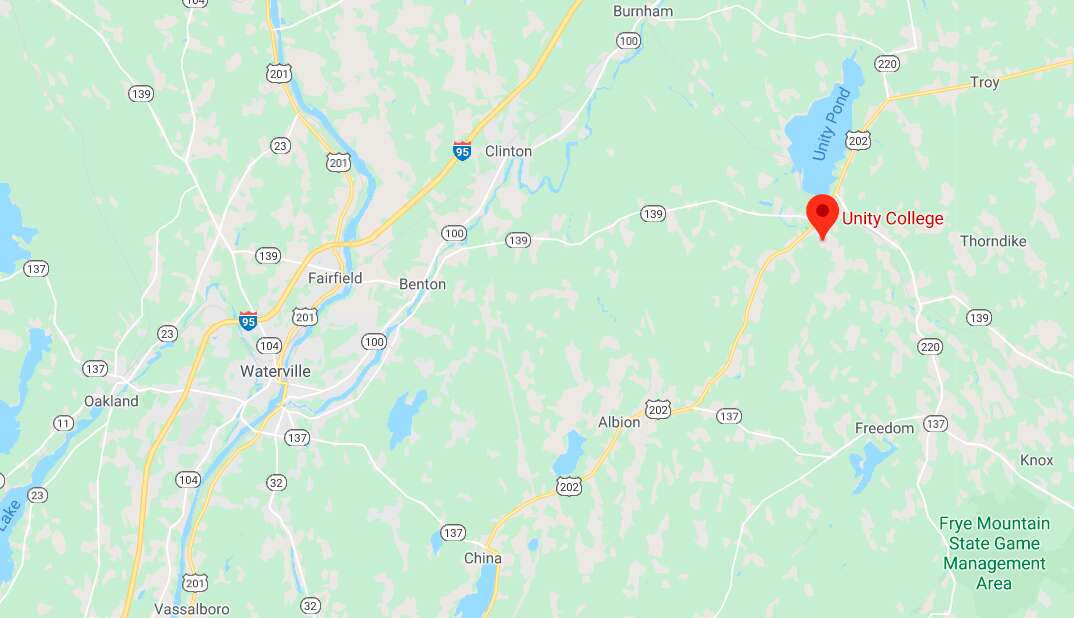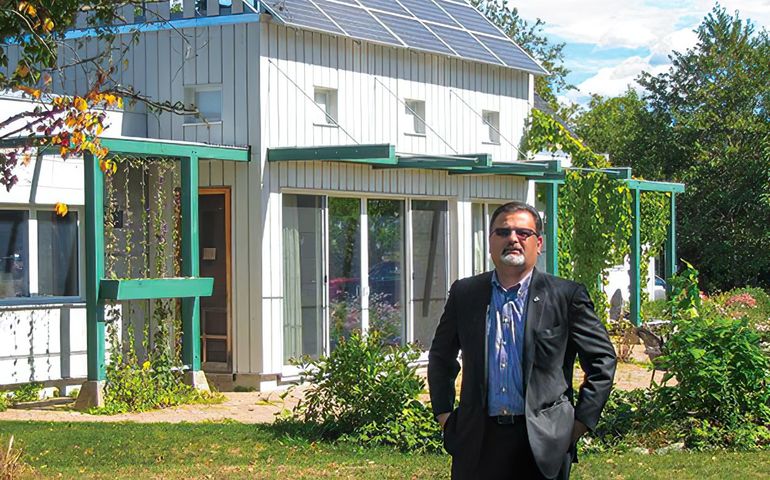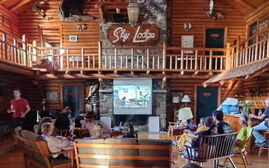
Unity College will permanently shift to hybrid model, consider selling campus
 Photo / Peter Van Allen
Melik Peter Khoury, president of Unity College, said the college's new hybrid learning program, which could involve selling off assets, including its Unity campus, will add to the sustainabilty of its offerings.
Photo / Peter Van Allen
Melik Peter Khoury, president of Unity College, said the college's new hybrid learning program, which could involve selling off assets, including its Unity campus, will add to the sustainabilty of its offerings.
More Information
Unity College will permanently transition to a hybrid learning model and explore selling its Waldo County campus, the college announced Monday. The move is not only designed to help the school and its students ride out the pandemic, but make it sustainable for the future, said President Melik Peter Khoury.
The college, which focuses on environmental education, has laid off 33 members of its 185-person staff and faculty, and furloughed anouther 20, according to the Bangor Daily News. It has retained a real estate firm to explore the sale of any assets, including the 225-acre main campus at 90 Quaker Hill Road in Unity, although Khoury told the Bangor Daily News that selling the campus is something that's being explored, and not definite.
The college celebrated its 50th anniversary in 2015 and the board of trustees decision to pursue a hybrid learning is a 180-degree turn from where the college was heading five years ago. At the time, the focus was on new buildings and infrastructure. The new plan eliminates the focus on a central physical campus and allows the college's students — 70% of whom are not from Maine — more flexibility.
The college announced in May that it would open this fall with the hybrid model, which has a nonstandard calendar, shorter terms, differentiated tuition and a multi-modality curriculum.
“Going from campus-centered to entirely hybrid with no dependence on a fixed campus is the very essence of the type of innovation needed to succeed in today’s economic and educational environment,” Khoury said in a news release. “Eliminating a centralized campus allows us to meet Unity students where they are and offer face-to-face and online courses in multiple locations to best fit the learning experience.”
Building a sustainable model
Khoury said the model is particularly relevant during the COVID-19 pandemic, but will also help sustain the college's focus on education during other unprecedented events, allowing students from around the globe and of all abilities can continue to pursue their education. The number of the college's 1,000 students that attend through distance learning is increasing, college officials have said.
“While the financial impact of COVID-19 certainly expedited our plans, this transition to a fully hybrid model is not simply a reaction to the pandemic,” Khoury said. “It is a critical next step in helping Unity College thrive and better serve our students in the 21st century, while happening to create a model that is relatively pandemic-proof.” The move comes as several small colleges in New England have closed in the past couple of years, a trend that's increased during the pandemic.
The decision to make the hybrid model permanent reduces the college’s dependence on a fixed campus and allows the college to further invest in "its successful remote-learning opportunities, increasing its focus on providing education to students in the physical environment relevant to individual courses."
Under the new plan, Unity will continue to offer distance education, which provides immersive technologies, challenging field assignments and real-world learning for online bachelor’s degrees, master’s degrees or non-degree credits. The college in January announced five new degree distance learning programs.
The plan includes leveraging locations across Maine, including Unity College Sky Lodge in Moose River, which is north of Jackman, near the Canada border in Somerset County; at Acadia National Park and in Portland.
A change over five years
Officials in the town of 2,000, which is 20 miles east of Waterville, told local news outlets they were blindsided by the decision. The college was founded by local business owners as a way to boost the town's economy.
When the college marked its 50th anniversary five years ago, it was celebrating an era of new focus on its campus, including announcing a $6 million campus expansion plan that included new dorms.
Five new buildings opened on the campus in the four years from 2012 to 2016. Khoury, who has been at Unity since 2013 and was named to the 2016 Mainebix Next List, told Mainebiz at the time, “We are building the infrastructure."
The college had the first passive house construction building in the state — Terrahause, a six-apartment dorm built in 2011 — and had acquired the McKay Farm in nearby Thorndike for agricultural research work.
"We're becoming an economic driver in Maine,” Khoury told Mainebiz. “Maine has 'Vacationland.' I want Maine to become 'Educationland.'"
'Retools how we envision education'
Khoury said in Monday's release, "Hybrid learning retools how we envision education, aligns with the needs of the professional world and prepares students for their next chapter — whether that is a first job or graduate school — all while giving students control over their educational pace and path."
He said that the transition "is also a major stride toward Unity College’s mission to provide a more diverse, just, equitable and sustainable education.”
“Students can count on the same level of integrity Unity College is known for while benefiting from the model’s enhanced flexibility, accessibility, and affordability,” said Khoury. “Hybrid learning and distance education are built on the premise that everyone deserves the opportunity to earn an education.”
Erika Latty, chief learning officer of Unity College, said in the release the new focus fits with the college's philosophy. “Unity College has a rich history in community-based learning and offering courses in a variety of geographic locations to engage our students in immersive learning opportunities,” Latty said. "We can offer courses in community colleges, high schools, at any of our owned or leased spaces, and all over the world in places like Costa Rica to study ecology or Alaska to study climate change.”
Under the model, students may complete their degrees with the flexibility to pursue internships and job opportunities throughout the year, expanding their knowledge and experience in their field of study while building a professional network and resume, according to the announcement.













0 Comments